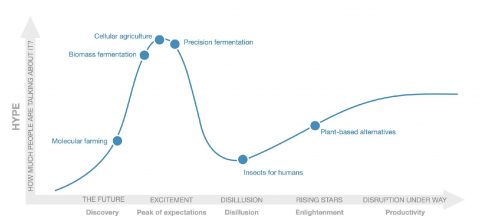“Alternative proteins” is a sub-category of the Food Science sector. See all definitions of FoodTech and its categories here.
The “alternative proteins” FoodTech category regroups startups developing alternative proteins products or ingredients. They mostly work with plant-based, fermentation, and cellular agriculture ingredients.
We have identified on this curve 6 food disruptors that threaten the status quo in the protein industry. These ecosystems, identified by the technology they use, are until now very distinct from each other. They use technologies and techniques that are mostly unique to them. This may change in the coming years as some players are making rapid progress as their industry matures and some techniques (such as 3D printing) could be used in many areas. Their position on this curve (see opposite) is mostly relative to each other rather than an absolute:

- Plant-based alternatives are the most advanced. However, many challenges remain to reach full productivity.
- Insects for human companies are in a hard position. After years of regulatory fight, insects now can be more easily sold in the West, but they have been lost some of their attractively as plant-based products appear now as “the alternative”.
- Cellular, biomass and molecular farming are still far behind as they face technology, market and regulatory challenges. However, they are approaching a peak of hype as more and more journalists are talking about it (notably to report startups’ very optimistic predictions).
Key startups to consider
- Beyond Meat and Impossible Foods: these startups mix various plants to recreate the texture of the meat, dairy product or seafood they are looking to replace.
- Algama and Triton: algae specialists, they have exciting technologies and functional ingredients to help other alternatives succeed.
- Just Foods, Aleph Farm, Mosa Meat, Gourmey: cellular agriculture companies
- Perfect Day, a US precision fermentation startup. The basic principle is to genetically modify a yeast which will then produce desired proteins.
DigitalFoodLab’s additional insights
- 14/10/2021 – Alternative proteins: good news & big doubts
- 01/09/2021 – Beyond milk: the excitement around dairy alternative is building up
- 25/08/2021 – From the labs to the shelves, alternative proteins are coming
- 19/07/2021 – Is protein the gold of the future?
- 10/06/2021 – Dairy alternatives everywhere
- 01/06/2021 – Alternative proteins- what are we talking about?
- 03/05/2021 – Zapping: $10B IPO for Oatly and is 2023 the new 2021 for alternative proteins?
- 16/03/2021 – Planted, the Swiss plant-based startup raises CHF17M
- 03/03/2021 – Bel & Danone love for alternative proteins is expanding
- 12/02/2021 – Future Meat raises more money to produce $7.50 cellular chicken breasts
- 29/01/2021 – FoodTech Zapping: cellular agriculture bubble?
- 18/01/2021 – Air Protein raises $32M to grow protein from the air we breathe
- 28/12/2020 – Cellular agriculture creates waves in Europe
- 26/11/2020 – The Protein Brewery, a Dutch fermentation-based alternative protein startup raises €22M
Get in Touch
We work with our clients to identify and act on the best Foodtech opportunities
By email
contact@digitalfoodlab.com
Our office
14 avenue de L’Opéra, 75001 Paris, France

